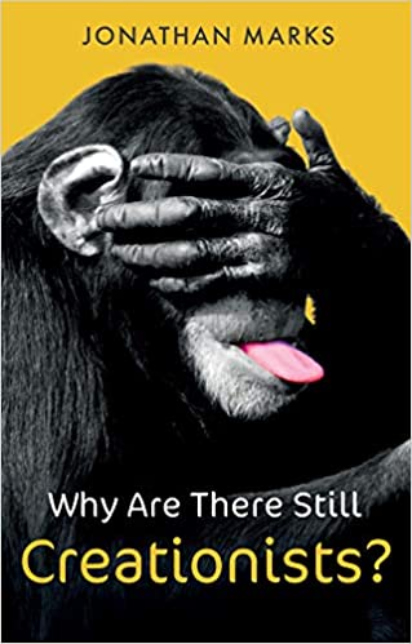Anthropologist Jonathan Marks has written extensively about science, considering in his work mainly the social and political issues related to human origins, human diversity, the construction of race as a biological category, and evolutionary theories. In this book, Marks continues in this trajectory by juxtaposing the stories of ancestry in science and religion and the myths of both.
 In the debate between Darwinism and creationism (the view that the first book of the Bible — Genesis — is a literal book of facts regarding the origin of the universe), Marks is very clear about where he stands. He is not in the business of dismissing creationism as an anti-science movement, the product of archaic ignorance. Yet he makes it clear that neither does he belong to the party of Richard Dawkins, which passionately defends the notion that science is inherently atheistic, the answer for every mystery. Rather, he positions himself as an agnostic, who capitalizes “Him” in reference to God, as he explains, “out of politeness and custom” (page xi). In fact, Marks thinks that the question of God’s existence has no relevance for the debate over origins. He finds it difficult to believe that supernatural beings exist, but he would not mind if they did. “The only beings that I am aware of interacting with are the ones inhabiting the natural realm, not the supernatural” (page xi). But he does not appreciate the narrow view of creationists who endorse the idea that evolutionary biology and geology are systematically wrong, that humans were specially created by God, and that the bulk of the geological formations we see today are the product of either the divine six-day creation or Noah’s mythical flood, as briefly and contradictorily described in the Bible.
In the debate between Darwinism and creationism (the view that the first book of the Bible — Genesis — is a literal book of facts regarding the origin of the universe), Marks is very clear about where he stands. He is not in the business of dismissing creationism as an anti-science movement, the product of archaic ignorance. Yet he makes it clear that neither does he belong to the party of Richard Dawkins, which passionately defends the notion that science is inherently atheistic, the answer for every mystery. Rather, he positions himself as an agnostic, who capitalizes “Him” in reference to God, as he explains, “out of politeness and custom” (page xi). In fact, Marks thinks that the question of God’s existence has no relevance for the debate over origins. He finds it difficult to believe that supernatural beings exist, but he would not mind if they did. “The only beings that I am aware of interacting with are the ones inhabiting the natural realm, not the supernatural” (page xi). But he does not appreciate the narrow view of creationists who endorse the idea that evolutionary biology and geology are systematically wrong, that humans were specially created by God, and that the bulk of the geological formations we see today are the product of either the divine six-day creation or Noah’s mythical flood, as briefly and contradictorily described in the Bible.
Although a book about theories of ancestry, Why Are There Still Creationists? is also a book about contemporary America. First, because the type of creationism that Marks describes (young-earth creationism) exists almost only among fundamentalist Protestant Christians in the United States. As reflected in Pope John Paul II’s 1996 address to the Pontifical Academy of Science, “Truth Cannot Contradict Truth,” Roman Catholicism is officially at peace with the theory of evolution. In this address, the Pope formally acknowledged the idea that evolution and the divine were complementary realities, allowing that evolution can coexist with Catholic doctrine. Second, when discussing evolution and creationism, Marks writes about the situation of America today: an age when the American public witnessed the Capitol being invaded by what looked like a horde of barbarians; when scientific knowledge about a deadly global pandemic, the efficacy of vaccines, and global warming have been bluntly rejected in favor of patently ludicrous beliefs and conspiracy theories; and when white evangelicals avow racist rhetoric and policies that seem incompatible with the vaunted values of Christianity. Against this complex backdrop, rife with the dis- trust of science, Marks aims to answer the question posed in the title of his book.
In order to do so, Marks divides his book into six chapters: “Introducing the Ancestors,” “Scientific Stories of Our Ancestors,” “Attacking Evolution,” “Biblical Literalism and Rationalism,” “Myths of Science and Religion,” and “Sacred Ancestry.” Throughout the book, Marks does not promote the belief that science is the promised and enlightened ultimate stage of human civilization. In fact, consistent with his body of work, he acknowledges the historical misuse of Darwinism: the supposed scientific rationale for eugenics, race and gender superiority, and, consequently, colonialism. Marks shields neither science nor religion from their own missteps. He writes, “Not taking evolution seriously is bad, but taking evolution too seriously is also bad” (page 88).
Marks does not think that more science is the antidote for creationism. Creationism is not the opposite of evolution. It is more properly understood as a theological stance on how to interpret the Bible than as a strictly anti-science discourse. Creationists, according to Marks, “are reactionary, not primitive. They have adopted an extreme theology in face of rationalist narratives about who we are and where we came from. Their theology is consequently what defines them, not their approach to science” (page 93).
Such a book about young-earth creationism, its beliefs, and its social and political implications in American life is both welcome and relevant today. This book deserves attention from anyone who wants to understand better what is going on in the United States. The prose is very accessible and clearly written, and permeated with Marks’s characteristic sardonic wit. Why Are There Still Creationists? will appeal to a large audience beyond the academy but may also be used to good effect in undergraduate and graduate classrooms.
This version might differ slightly from the print publication.






